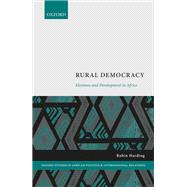How have African rulers responded to the introduction of democratic electoral competition? Despite the broadly negative picture painted by the prevailing focus on electoral fraud, clientelism, and ethnic conflict, the book argues that the full story is somewhat more promising. While these unfortunate practices may be widespread, African rulers also seek to win votes through the provision and distribution of public goods and services. The author's central argument is that in predominantly rural countries the introduction of competitive elections leads governments to implement pro-rural policies, in order to win the votes of the rural majority. As a result, across much of Africa the benefits of democratic electoral competition have accrued primarily in terms of rural development. This broad claim is supported by cross-national evidence, both from public opinion surveys and from individual level data on health and education outcomes. The argument's core assumptions about voting behavior are supported with quantitative evidence from Ghana, and qualitative historical evidence from Botswana presents further evidence for the underlying theoretical mechanism. Taken together, this body of evidence provides reasons to be optimistic about the operation of electoral accountability in Africa. African governments are responding to the accountability structures provided by electoral competition; in that sense, democracy in Africa is working.
Oxford Studies in African Politics and International Relations is a series for scholars and students working on African politics and International Relations and related disciplines. Volumes concentrate on contemporary developments in African political science, political economy, and International Relations, such as electoral politics, democratization, decentralization, the political impact of natural resources, the dynamics and consequences of conflict, and the nature of the continent's engagement with the East and West. Comparative and mixed methods work is particularly encouraged. Case studies are welcomed but should demonstrate the broader theoretical and empirical implications of the study and its wider relevance to contemporary debates. The series focuses on sub-Saharan Africa, although proposals that explain how the region engages with North Africa and other parts of the world are of interest.
Series Editors: Nic Cheeseman, Professor of Democracy and International Development, University of Birmingham; Ricardo Soares de Oliveira, Professor of the International Politics of Africa, University of Oxford; Peace Medie, Senior Lecturer, School of Sociology, Politics, and International Studies, University of Bristol.








